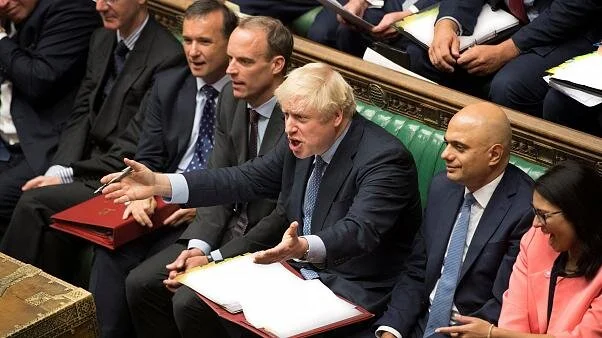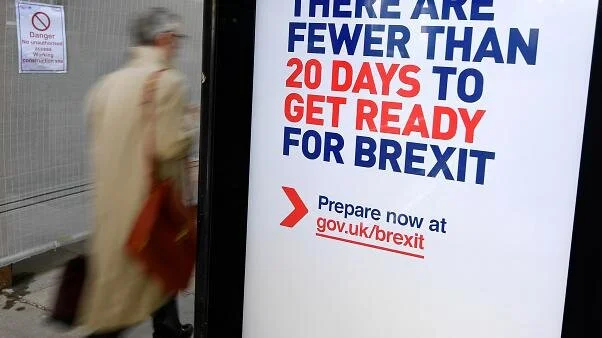Two Steps Forward, Two Steps Back! Britain’s Brexit Melodrama Continues Apace By Stephen Barber
As Parliament continues to frustrate Boris Johnson’s Brexit plans, meeting populist rhetoric with scrutiny and procedure, Britain is seemingly no closer to leaving the EU. Renewed calls for a General Election meanwhile seem unlikely to be able to resolve the impasse. There is still limited appetite for a confirmatory referendum – but it might yet be the only way to break the deadlock.
Last Monday Boris Johnson won the first major Parliamentary vote of his premiership and, to be fair, it was a big one. Where Theresa May had failed before him and failed spectacularly, Johnson achieved parliamentary approval for the second reading of his Brexit Bill. That is the legislation which seeks to approve the withdrawal deal he negotiated at breakneck speed with Brussels.
Prime Minister Boris Johnson (Euronews)
The haste, of course, was motivated by the 31 October deadline for Britain finally leaving which Johnson had promised to ‘do or die’ and that he would rather ‘die in a ditch’ than seek a further extension. Unfortunately for Number 10 his moment of victory was short lived because barely 20 minutes later MPs rejected its accompanying Programme Motion. This is the timetable for legislation which had allotted a derisory 2 days of debate for MPs. Johnson responded by ‘pausing’ the Brexit legislation.
This was the tenth Parliamentary defeat of Johnson’s three-month old government. The ninth had come on Saturday when the House sat to approve the Johnson deal in a meaningful vote. Before MPs had the chance to go through the lobbies, an amendment moved by Backbencher Sir Oliver Letwin passed. This withheld approval for the agreement until all the laws have been passed. In turn, it kicked in the legislation resulting from Johnson’s second and third defeats, the so-called Benn Act, which required government to write to Brussels requesting a further extension had Parliament not approved a deal by 11pm 19 October (Saturday). Are you keeping up?
Well Johnson has not died in a ditch. He dutifully sent the letter (childishly failing to sign it) and the EU is all but certain to approve an extension (but until when?). And that all means that Britain cannot and will not now leave the EU on 31 October (despite Johnson’s claims to the contrary).
Jeremy Corbyn (AP)
How to deflect such failure? Johnson might lack support in the Commons but he has been relatively successful in deflecting blame in the country. The tabloids bemoaned ‘why wont they let us leave?’ echoing Johnson’s own populist rhetoric. And the strategy is clearly to demand a general election, again and again. This is no longer in the PM’s hands and requires a two thirds majority of all MPs. Corbyn’s opposition is minded to deny the request, demanding that a ‘no deal’ is taken off the table first. This leaves Johnson with the same Parliament which has defeated his government ten times and his predecessor Theresa May many times more.
So we are two steps forward, maybe two steps back.
Johnson’s new and frequently repeated mantra ‘Let’s Get Brexit Done’ is much more powerful than its throwaway status might suggest. Think about it. It says the detrimental economic impact of Brexit, the job losses, the business exodus, the disruption to supply chains, food and medicine shortages, the damage to global influence; it says all this doesn’t matter. We are bored of it. Let’s just get it done. It speaks to a weary public whichever way they voted and even to our EU partners who surely want to get on with their lives. And it could be a powerful election slogan if the prime minister gets to take his case to the country.
But aside from the question of whether the PM will get his election is the more profound question of whether it would be capable of addressing the Brexit impasse. The likelihood is that it could not. As the experience of 2017 showed, single issue elections are impossible to call and no party has won 50% of the vote since 1931 making any mandate imperfect to claim. Plus current polling indicates the likelihood of yet another hung parliament in any case.
Photo by Euronews
The idea of a second or confirmatory referendum (or ‘people’s vote’) has been around ever since the historic vote to leave the EU itself. Just how compelling a proposition has ebbed and flowed with circumstances, momentum and events. Even though the best part of a million people marched on Westminster on Saturday demanding a ‘people’s vote’, there has been much less appetite inside the House of Commons. It is, supposedly, Labour Party policy but leader Jeremy Corbyn, is never very certain about it and neither is the party clear if it should be held before or after an election. An amendment to Saturday’s ‘meaningful vote’ was not in the end voted on as the government pulled the motion but nonetheless was not believed to have sufficient support. A later Liberal Democrat amendment to the Queen’s Speech forcing a fresh vote was not even selected by Speaker Bercow for debate.
But given where we are, putting the question back to the people might come to be accepted (eventually) as the only way of breaking the parliamentary deadlock. This is, after all, an issue that cuts across party lines and which has expected a representative democracy to deal with the imperfect instructions of a badly thought through moment of direct democracy. And for a populist leader like Johnson, who prefers the spotlight to actual governing, one might expect there to be some appeal to another big campaign.
Stephen Barber, (@StephenBarberUK) Assistant Dean for Programmes, Regent’s London University








